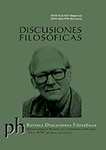Autores/as
Resumen
Según Kemp Smith, Descartes creía que los animales carecían de sentimientos y sensaciones. Esta creencia se denomina la ‘Tesis Monstruosa’, la cual exploro aquí en vista de dos aproximaciones Cartesianas a los animales. En primer lugar, analizo su tratamiento original en función de una aproximación metafísica temprana de Descartes, i.e., todos los fenómenos naturales deben explicarse en función de puro escrutinio mental. Como el dolor solo existiría en el entendimiento, y los animales carecen de entendimiento y de alma, Descartes habría considerado que ellos no sufrían. En segundo lugar, examino el naturalismo tardío Cartesiano; específicamente, en relación con cómo los animales son considerados como máquinas que podrían sufrir. Por último, concluyo que la ‘Tesis Monstruosa’ no es verdaderamente Cartesiana, pues los animales son máquinas con sentimientos y sensaciones. Sin embargo, la actitud indulgente de Descartes hacia los humanos que comen y matan animales, supone que la empatía por seres que podrían sufrir no es necesaria. Esto da lugar a dudas acerca de otra ‘Tesis Monstruos
Palabras clave
Citas
Carriero, John. Between Two Worlds: A Reading of Descartes' Meditations. Oxfordshire: Princeton University Press, 2009. Print.
Clarke, Desmond. Descartes’ Theory of Mind. Oxford: OUP, 2003. Print. Cottingham, John. "Descartes' treatment of animals". Descartes. Oxford: OUP, 1998. 225-233. Print.
Descartes. Discourse on the Method. The Philosophical Writings of Descartes, Vol. I. New York: Cambridge University Press, 1985. 111-151. Print.
_____. Passions of the Soul. The Philosophical Writings of Descartes, Vol. I. New York: Cambridge University Press, 1985. 328-404. Print.
_____. Meditations on First Philosophy. The Philosophical Writings of Descartes, Vol. II. New York: Cambridge University Press, 1985. 1-62. Print.
_____. The Correspondence. The Philosophical Writings of Descartes, Vol. III. New York: Cambridge University Press, 1991. Print.
Gewirth, Alan. "Clearness and Distinctness in Descartes". Descartes. Oxford: OUP, 1998. 79-100. Print.
Hatfield, Gary. "Animals". A Companion to Descartes. Oxford: Blackwell Publishing, 2008. 404-425. Print.
Regan, Tom & Singer, Peter. Animal Rights and Human Obligations. Englewood Cliffs, NJ: Prentice Hall, 1976. Print.
Smith, Kemp. New Studies in the Philosophy of Descartes. London: Macmillan, 1952. Print.
Sorajbi, Richard. Animal Minds and Human Morals: The Origins of the Western Debate. Ithaca, NY: Cornell University Press, 1993. Print.

 pdf
pdf
 FLIP
FLIP

























